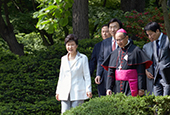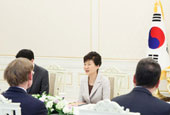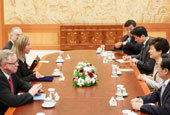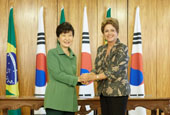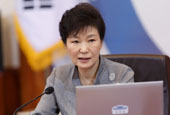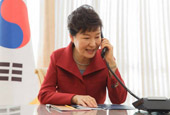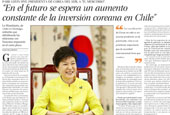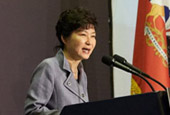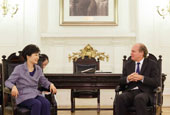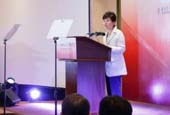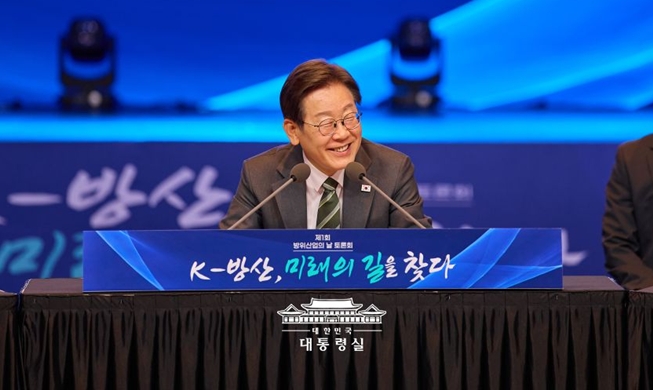President Park Geun-hye has stressed the importance of in-the-field regulatory reforms in order to help the economy recover.
"We need to carry out drastic regulatory reforms in order to bring about an economic recovery and to create jobs for youths," said President Park during the third regulatory reform ministerial meeting, held at Cheong Wa Dae on May 6. "It is no exaggeration that the core tasks of the government's efforts toward economic recovery and economic innovation are regulatory reforms."

President Park said the government's efforts at regulatory reform need to become more field- and user-oriented.
"From now on, the quality of regulations themselves needs to be upgraded in a creative way," said President Park. "Regulations should be adopted only when there are no alternatives and they need to be made in a way that guarantees as much freedom for the private sector as possible."
In addition, the president said the way regulations are implemented and the quality of regulations need to meet global standards so that Korea can attract more foreign investment and so that local companies can do more business abroad.
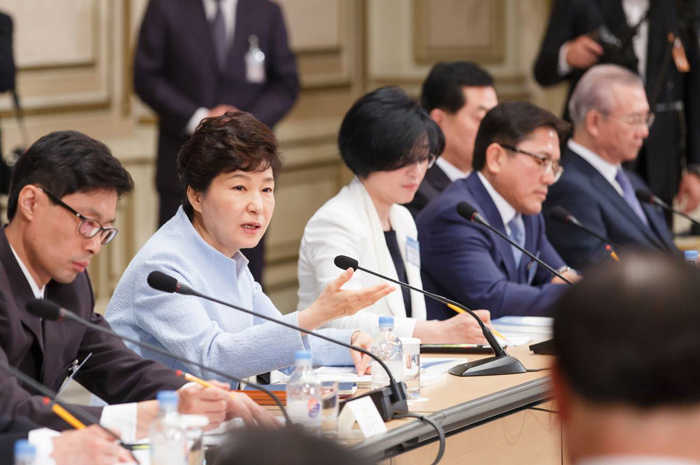
Regulatory reforms related to foreign direct investment in Korea, which were announced on May 6, contained 41 tasks and the government stated that all of them will be completed by the end of the year.
In one example, concerning the airplane repair and maintenance industry, the shareholdings of a foreign direct investor are capped at 49 percent under current aviation laws. This limit will be abolished so that non-Korean investors will be able to own 100 percent of an aviation repair businesses in Korea in the future.
In another example, the number of non-Korean employees at foreign companies is capped at 20 percent of the total number of Korean employees. Under the new regulatory reforms, the government intends to allow such companies to hire more non-Korean employees during their first two years of operations in the country.
As the demand for education in such professional areas as design, programming and beauty products is growing, the government has decided to allow non-Korean educational institutes to do business in Korea. So far, educational working visas have only been issued to invitees at colleges (an E-1 visa) and to language instructors (E-2), but the government intends to issue more working visas for instructors specialized in other areas, as well.
By Limb Jae-un
Korea.net Staff Writer
Photos: Cheong Wa Dae
jun2@korea.kr
"We need to carry out drastic regulatory reforms in order to bring about an economic recovery and to create jobs for youths," said President Park during the third regulatory reform ministerial meeting, held at Cheong Wa Dae on May 6. "It is no exaggeration that the core tasks of the government's efforts toward economic recovery and economic innovation are regulatory reforms."

President Park Geun-hye (middle) says, 'Efforts to solve problems in the field need to be institutionalized at each ministry,' at Cheong Wa Dae on May 6.
President Park said the government's efforts at regulatory reform need to become more field- and user-oriented.
"From now on, the quality of regulations themselves needs to be upgraded in a creative way," said President Park. "Regulations should be adopted only when there are no alternatives and they need to be made in a way that guarantees as much freedom for the private sector as possible."
In addition, the president said the way regulations are implemented and the quality of regulations need to meet global standards so that Korea can attract more foreign investment and so that local companies can do more business abroad.

President Park Geun-hye (second from left) says, 'The way regulations are implemented and the quality of regulations need to meet global standards,' during the third regulatory reform ministerial meeting, at Cheong Wa Dae on May 6.
Regulatory reforms related to foreign direct investment in Korea, which were announced on May 6, contained 41 tasks and the government stated that all of them will be completed by the end of the year.
In one example, concerning the airplane repair and maintenance industry, the shareholdings of a foreign direct investor are capped at 49 percent under current aviation laws. This limit will be abolished so that non-Korean investors will be able to own 100 percent of an aviation repair businesses in Korea in the future.
In another example, the number of non-Korean employees at foreign companies is capped at 20 percent of the total number of Korean employees. Under the new regulatory reforms, the government intends to allow such companies to hire more non-Korean employees during their first two years of operations in the country.
As the demand for education in such professional areas as design, programming and beauty products is growing, the government has decided to allow non-Korean educational institutes to do business in Korea. So far, educational working visas have only been issued to invitees at colleges (an E-1 visa) and to language instructors (E-2), but the government intends to issue more working visas for instructors specialized in other areas, as well.
By Limb Jae-un
Korea.net Staff Writer
Photos: Cheong Wa Dae
jun2@korea.kr
Related Contents
Most popular
- Grammy-winning producer calls Suga of BTS 'amazing artist'
- Animated 'KPop Demon Hunters' tops Netflix charts in 41 markets
- 'Squid Game' events to pump up K-Content Seoul Travel Week
- Reunited BLACKPINK releases video preview of world tour
- 'Universal love, family' themes fuel success of 'King of Kings': director
